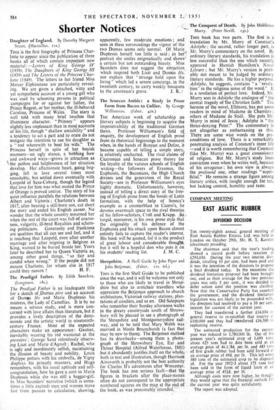Shorter Notices
- Daughter of England. By Dorothy Margaret Stuart. (Macmillan. 2 is.)
Tins is the first biography of Princess Char- lotte to appear since the publication of three books all of which contain impodant new material : —Letters of King George IV (1939), The Daughters of King George III (1939) and The Letters of the Princess Char- lotte (1949). The letters to her friend Miss Mercer Elphinstone are particularly reveal- ing. We are given a detached, witty and yet sympathetic account of a young girl who was used by scheming persons in political campaigns for or against her father, the Prince Regent, or her mother, the ill-behaved Caroline, Princess of Wales. The story is well told with many brief touches that illuminate character. " Prinney " appears slightly less unpleasant than in most accounts of his life, though " shallow amiability " and a tendency to act a part and to orate do not mitigate the intention to use his daughter as a " rod wherewith to beat his wife." The Princess herself in spite of her boyish manners—an ugly stance, a bobbing bow „ and awkward ways—grows in attraction as the pathos and helplessness of her situation develop. Her affectionate heart, going beg- ging, fell in love several times most unsuitably, but settled down eventually with Leopold of Saxe-Coburg, though the legend that love for him was what ousted the Prince of Orange is proved untrue. The story of his quiet influence parallels the relations between Albert and Victoria ; Charlotte's death in 1817, after bearing a still-born son, cut short the story and ended his English career. No wonder that the whole country mourned her when the rest of the court was full of coarse- ness, vulgarity, ill-bred Royalties and schem- ing politicians. Generosity and frankness are qualities that all can see and feel, and it is touching that Leopold, even after another marriage and after reigning in Belgium as King, wanted to be buried beside her. Years later he described her to Queen Victoria as, among other good things, " so fair and candid when wrong." If the people did not mourn Charlotte, for whom else in 1817


































 Previous page
Previous page